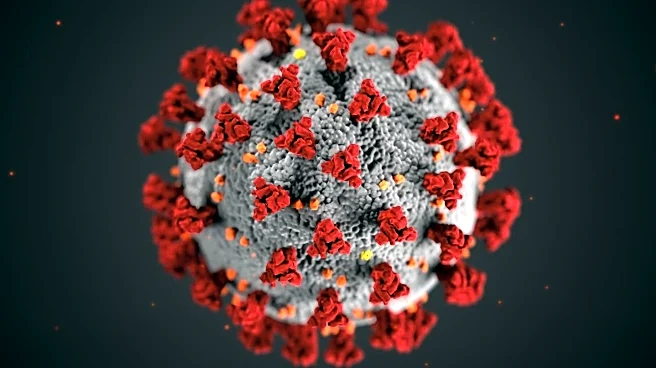What's Happening?
Scientists at Scripps Research have conducted a genome-wide siRNA screen to identify human proteins that SARS-CoV-2 uses for replication. This research, published in PLOS Biology, highlights the potential for developing drugs that target host proteins rather than the virus itself. The study identified 32 proteins essential for early infection stages and 27 for later stages, along with several cellular pathways exploited by the virus. Notably, two proteins, perlecan and BIRC2, emerged as promising drug targets. Perlecan's sugar chains interact with the virus's spike protein, potentially acting as a co-receptor, while BIRC2 is involved in cellular inflammation pathways. The research team tested these proteins against other coronaviruses, finding 17 proteins consistently used across SARS-CoV-1, MERS-CoV, and a seasonal coronavirus, suggesting a basis for pan-coronavirus therapies.
Why It's Important?
The identification of host proteins as drug targets offers a strategic advantage in combating SARS-CoV-2 and other coronaviruses. By focusing on human proteins, treatments may be less susceptible to viral mutations and drug resistance, providing a robust defense against evolving pathogens. This approach could lead to the development of pan-coronavirus therapies, effective against current and future coronavirus strains. The research underscores the potential for preemptive antiviral strategies, which could be deployed early in future outbreaks, enhancing public health preparedness and response capabilities.
What's Next?
Researchers plan to investigate whether the identified host proteins are also utilized by other respiratory pathogens like influenza and RSV. Further studies will focus on testing the safety and efficacy of promising compounds, potentially leading to new therapeutic options. The ongoing research aims to expand the understanding of host-pathogen interactions and develop broad-spectrum antiviral drugs that could mitigate the impact of future pandemics.
Beyond the Headlines
Targeting host proteins rather than the virus itself presents ethical and scientific challenges, including ensuring minimal impact on normal cellular functions. The approach may also influence drug development paradigms, shifting focus from pathogen-specific treatments to broader, host-targeted strategies. This could lead to long-term shifts in how infectious diseases are managed, emphasizing prevention and early intervention.









